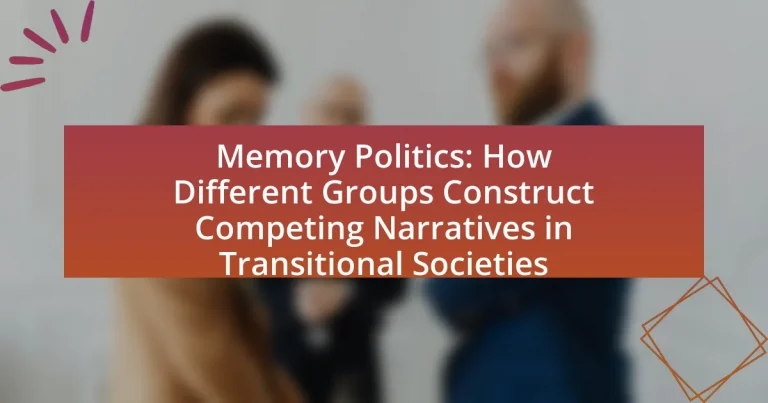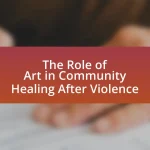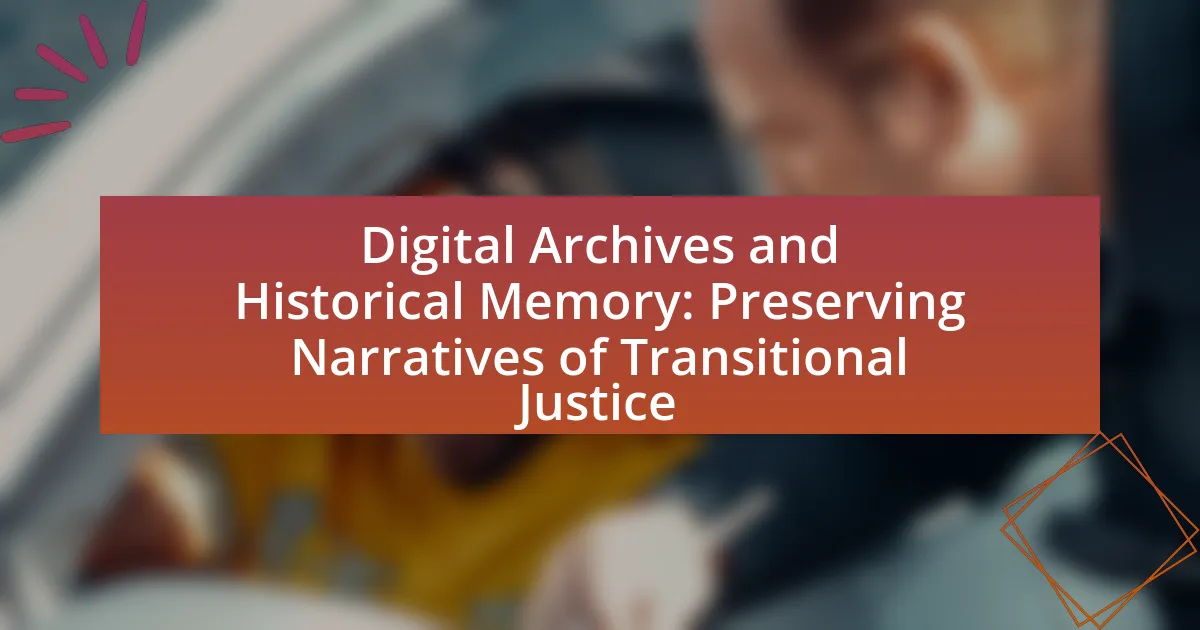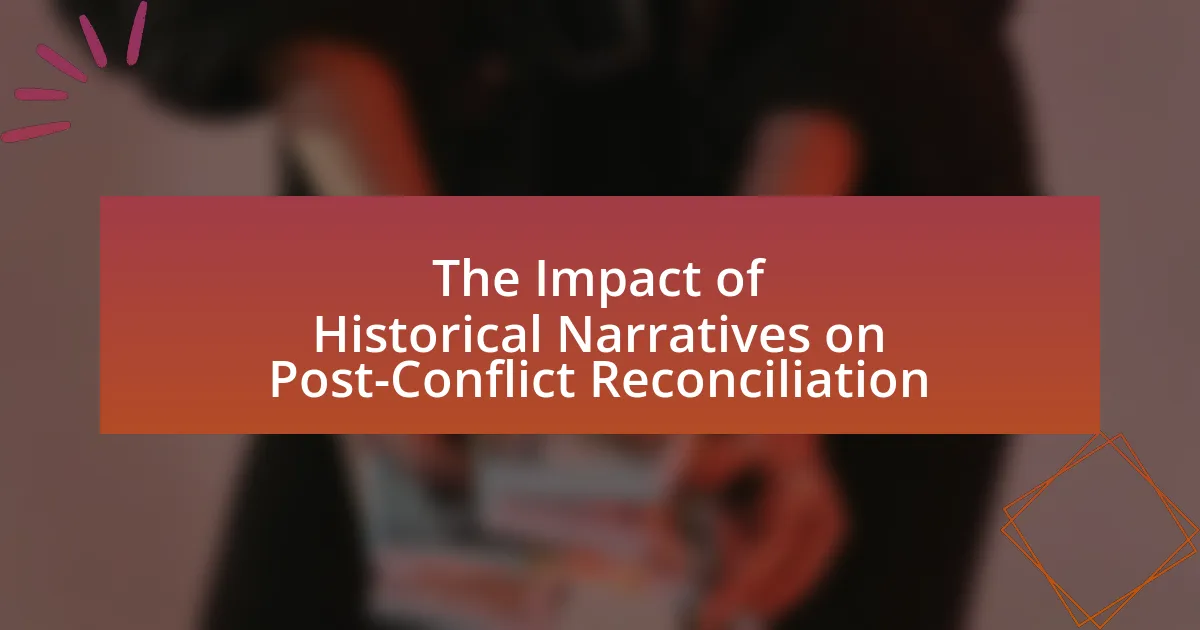Memory politics in transitional societies refers to the strategies through which various groups construct, contest, and negotiate collective memories of historical events, particularly during political transitions such as post-conflict or post-authoritarian periods. This article examines how memory politics shapes national identity, influences reconciliation processes, and affects social cohesion by highlighting key elements such as collective memory, historical narratives, and power dynamics. It also explores the emergence of competing narratives, the role of political actors, and the impact of media and education on societal perceptions. Furthermore, the article discusses the psychological effects on individuals, the challenges posed by conflicting narratives, and best practices for fostering inclusive dialogue and promoting diverse narratives in transitional contexts.
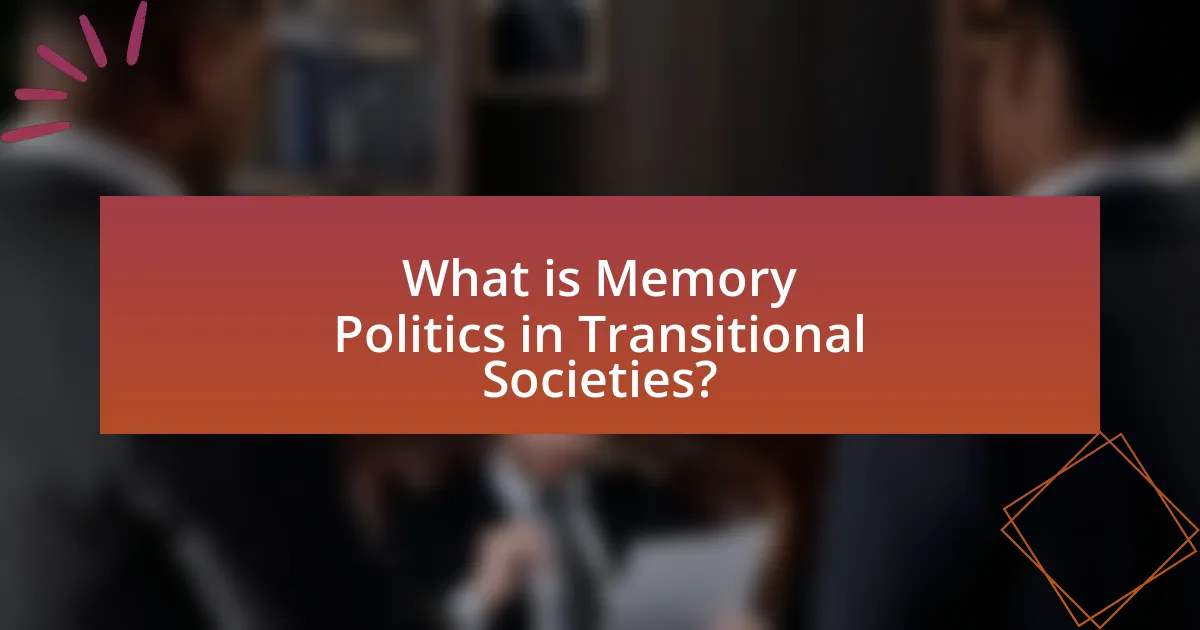
What is Memory Politics in Transitional Societies?
Memory politics in transitional societies refers to the ways in which different groups construct, contest, and negotiate collective memories of past events, particularly in the context of political transitions such as post-conflict or post-authoritarian scenarios. This phenomenon is crucial as it shapes national identity, influences reconciliation processes, and impacts social cohesion. For instance, in South Africa, the Truth and Reconciliation Commission aimed to address the apartheid era’s injustices by fostering a shared narrative, while in countries like Bosnia and Herzegovina, competing memories of the Yugoslav Wars have led to ongoing ethnic tensions. These examples illustrate how memory politics can either facilitate healing or perpetuate divisions, highlighting its significance in transitional societies.
How do different groups define Memory Politics?
Different groups define Memory Politics as the strategies and practices used to shape collective memory and historical narratives, often reflecting their specific interests and identities. For instance, political entities may utilize Memory Politics to legitimize their authority by promoting certain historical events while marginalizing others, as seen in post-conflict societies where dominant groups may emphasize their victimization to gain sympathy and support. Academic scholars, such as Jan Zielonka in “Counter-Revolution: Liberal Europe in Retreat,” argue that Memory Politics can serve as a tool for social cohesion or division, depending on how inclusive or exclusive the narratives are. Additionally, grassroots movements often engage in Memory Politics to reclaim marginalized histories, advocating for recognition and justice, which highlights the dynamic interplay between memory, identity, and power in shaping societal narratives.
What are the key elements of Memory Politics?
The key elements of Memory Politics include collective memory, historical narratives, identity formation, and power dynamics. Collective memory refers to how groups remember and interpret past events, shaping their identity and values. Historical narratives are constructed by various groups to promote specific interpretations of history, often leading to competing versions of events. Identity formation occurs as groups use these narratives to solidify their sense of belonging and differentiate themselves from others. Power dynamics play a crucial role, as dominant groups often control the prevailing narratives, influencing public memory and historical discourse. These elements interact to shape how societies remember their past and address issues of justice and reconciliation.
How does Memory Politics influence societal narratives?
Memory politics significantly influences societal narratives by shaping collective memory and identity through the selective remembrance or forgetting of historical events. This process is often utilized by political actors to legitimize their authority or to mobilize support by framing narratives that resonate with specific groups. For instance, in post-apartheid South Africa, the Truth and Reconciliation Commission aimed to address past injustices, influencing national narratives around forgiveness and unity, while simultaneously sparking debates over which memories should be prioritized. Such dynamics illustrate how memory politics can create competing narratives that reflect the interests and identities of different societal groups, ultimately impacting social cohesion and political discourse.
Why is Memory Politics significant in transitional societies?
Memory politics is significant in transitional societies because it shapes collective identity and influences the reconciliation process after conflict or authoritarian rule. In these contexts, different groups often construct competing narratives about past events, which can either foster unity or exacerbate divisions. For instance, in post-apartheid South Africa, the Truth and Reconciliation Commission aimed to address historical injustices by acknowledging multiple perspectives, thereby promoting healing and social cohesion. This illustrates how memory politics can play a crucial role in determining the trajectory of societal transformation and the establishment of a shared future.
What role does Memory Politics play in reconciliation processes?
Memory Politics plays a crucial role in reconciliation processes by shaping collective identities and narratives that influence how societies remember past conflicts. It facilitates dialogue between conflicting groups by acknowledging historical grievances and fostering a shared understanding of the past. For instance, in post-apartheid South Africa, the Truth and Reconciliation Commission utilized memory politics to address the atrocities of the apartheid era, allowing victims and perpetrators to share their stories, which helped to build a foundation for national unity. This approach demonstrates that effective memory politics can promote healing and coexistence by transforming individual memories into a collective narrative that supports reconciliation efforts.
How does Memory Politics affect collective identity formation?
Memory politics significantly influences collective identity formation by shaping how groups remember and interpret historical events. This process involves the selective emphasis on certain narratives while marginalizing others, which can foster a sense of belonging and shared identity among members of a group. For instance, in post-apartheid South Africa, the official narrative around reconciliation and shared history has been pivotal in forming a collective national identity, while simultaneously, various ethnic groups may promote their own historical grievances to assert distinct identities. This dynamic illustrates how memory politics can create both unity and division, as competing narratives vie for recognition and legitimacy within the broader societal context.
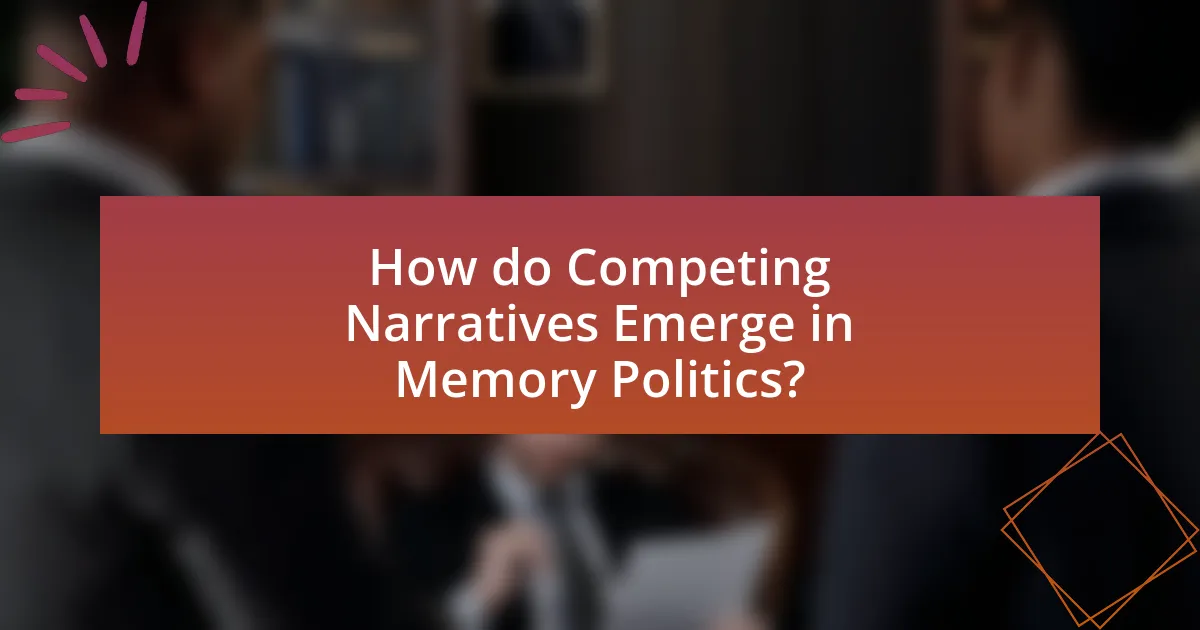
How do Competing Narratives Emerge in Memory Politics?
Competing narratives in memory politics emerge through the conflicting interpretations of historical events by different social, political, or cultural groups. These groups often seek to establish their own version of history to legitimize their identity, values, and political agendas. For instance, in post-conflict societies, groups may emphasize different aspects of a shared past, such as victimhood or heroism, to shape collective memory and influence public discourse. This phenomenon is evident in countries like Rwanda, where the narratives surrounding the genocide differ significantly between the Hutu and Tutsi communities, each framing the events to support their respective political and social objectives. The emergence of these narratives is often fueled by factors such as political power struggles, educational curricula, media representation, and commemorative practices, which collectively contribute to the ongoing contestation of memory in society.
What factors contribute to the creation of competing narratives?
Competing narratives are created by factors such as differing historical interpretations, cultural identities, political agendas, and social contexts. Historical interpretations vary among groups, leading to distinct narratives about past events, as seen in post-conflict societies where victors and victims recount different versions of history. Cultural identities shape how groups perceive their experiences and influence the narratives they construct, often emphasizing their unique perspectives. Political agendas drive groups to promote specific narratives that align with their interests, as evidenced by governments or organizations seeking to legitimize their authority or justify actions. Social contexts, including media representation and public discourse, further amplify these narratives, allowing them to gain traction within society.
How do historical events shape these narratives?
Historical events shape narratives by influencing collective memory and identity within societies. For instance, the aftermath of the Holocaust has led to a strong Jewish narrative emphasizing survival and resilience, which contrasts with narratives from other groups that may focus on different aspects of World War II. These narratives are constructed through education, media representation, and public commemorations, which serve to reinforce specific interpretations of history. The way events are remembered or forgotten can significantly impact political discourse and social cohesion, as seen in post-apartheid South Africa, where the Truth and Reconciliation Commission aimed to address historical injustices while shaping a new national identity.
What role do political actors play in narrative construction?
Political actors play a crucial role in narrative construction by shaping public discourse and influencing collective memory. They utilize narratives to frame events, ideologies, and identities, often aligning them with their political agendas. For instance, during transitional periods, political leaders may emphasize specific historical events to legitimize their authority or to mobilize support, as seen in post-apartheid South Africa where leaders like Nelson Mandela promoted a narrative of reconciliation to foster national unity. This strategic use of narratives can significantly impact societal perceptions and historical interpretations, reinforcing or challenging existing power dynamics.
How do different groups utilize Memory Politics for their agendas?
Different groups utilize Memory Politics to shape collective identities and influence public discourse. For instance, nationalist movements often invoke historical grievances to foster unity and justify territorial claims, as seen in the Balkans where memories of past conflicts are mobilized to support contemporary political agendas. Similarly, marginalized communities may leverage Memory Politics to highlight historical injustices, seeking recognition and reparations, exemplified by Indigenous groups in Canada advocating for acknowledgment of colonial atrocities. Furthermore, political leaders may manipulate collective memories to consolidate power, as evidenced by authoritarian regimes that promote selective historical narratives to legitimize their rule. These strategies demonstrate how Memory Politics serves as a tool for various groups to advance their specific objectives within transitional societies.
What strategies do groups employ to promote their narratives?
Groups employ various strategies to promote their narratives, including the use of media, education, and public events. Media campaigns, such as social media outreach and traditional journalism, allow groups to disseminate their perspectives widely and shape public opinion. Educational initiatives, including workshops and curricula, help instill their narratives in younger generations, ensuring long-term influence. Public events, such as commemorations or protests, create visibility and foster community solidarity around their narratives. These strategies are supported by historical examples, such as the role of media in the civil rights movement, which effectively mobilized public support and altered societal perceptions.
How do media and education influence these narratives?
Media and education significantly shape narratives in transitional societies by framing historical events and influencing public perception. Media outlets often select which stories to highlight, thereby constructing a narrative that can either reinforce or challenge existing power structures. For instance, the portrayal of historical events in news reports or documentaries can lead to differing interpretations among various groups, as seen in the coverage of the Yugoslav Wars, where narratives varied widely based on the media source. Education systems also play a crucial role by determining the content of history curricula, which can promote specific national identities or collective memories. Research indicates that countries like South Africa have utilized educational reforms to address historical injustices, thereby influencing how future generations perceive their past. Together, media and education create a framework through which competing narratives are constructed and contested in transitional societies.
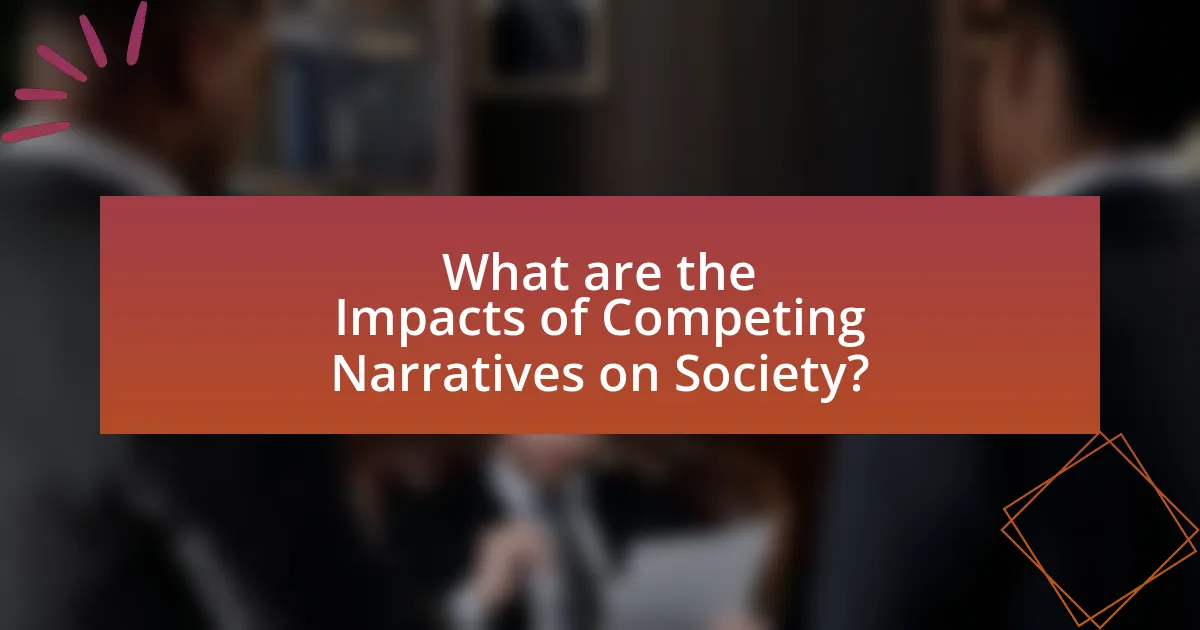
What are the Impacts of Competing Narratives on Society?
Competing narratives significantly impact society by shaping public perception, influencing political discourse, and affecting social cohesion. These narratives often arise in transitional societies where different groups seek to assert their version of history or identity. For instance, in post-apartheid South Africa, competing narratives about the past have influenced national policies and social relations, highlighting the struggle between reconciliation and justice. Research indicates that when multiple narratives coexist, they can lead to polarization, as seen in the case of the Israeli-Palestinian conflict, where differing historical accounts fuel ongoing tensions. Ultimately, the presence of competing narratives can either foster dialogue and understanding or exacerbate divisions within society.
How do competing narratives affect social cohesion?
Competing narratives can significantly undermine social cohesion by creating divisions among groups within a society. When different groups promote conflicting interpretations of historical events or social issues, it leads to polarization, as individuals align themselves with narratives that resonate with their identity and beliefs. For instance, in transitional societies, such as post-apartheid South Africa, the narratives surrounding the past can either foster reconciliation or exacerbate tensions, depending on how inclusive or exclusive they are. Research indicates that when narratives are perceived as legitimate by one group but not by another, it can result in social fragmentation and hinder collective efforts toward unity and healing.
What are the psychological effects on individuals within these societies?
The psychological effects on individuals within transitional societies often include trauma, identity confusion, and a sense of dislocation. Individuals frequently experience trauma due to past violence or oppression, which can lead to mental health issues such as PTSD, anxiety, and depression. Identity confusion arises as individuals grapple with conflicting narratives about their history and belonging, often exacerbated by the competing narratives constructed by different groups. This dislocation can manifest as a feeling of alienation from both their community and their own sense of self, impacting social cohesion and personal relationships. Research indicates that these psychological effects can hinder reconciliation processes and the establishment of a stable society, as seen in post-conflict regions like Rwanda and the former Yugoslavia, where collective memory and individual trauma significantly influence societal dynamics.
How do these narratives influence public policy and governance?
Narratives significantly influence public policy and governance by shaping societal perceptions and priorities. In transitional societies, competing narratives can dictate which historical events are emphasized or marginalized, thereby affecting policy decisions. For instance, the narrative surrounding a nation’s past injustices can lead to the implementation of reparative policies, as seen in South Africa’s Truth and Reconciliation Commission, which aimed to address the legacy of apartheid. This illustrates how narratives not only inform public discourse but also compel governments to adopt specific policies that reflect the collective memory and demands of various groups within society.
What challenges arise from competing narratives in Memory Politics?
Competing narratives in Memory Politics create significant challenges, primarily by fostering division and conflict among different societal groups. These narratives often reflect contrasting interpretations of historical events, leading to polarization and hindering social cohesion. For instance, in post-conflict societies, such as in the Balkans, differing accounts of the Yugoslav Wars have resulted in ongoing tensions and a lack of reconciliation. Additionally, competing narratives can complicate the establishment of a shared historical memory, making it difficult for societies to move forward collectively. This fragmentation can also impede policy-making and the implementation of justice, as different groups may demand recognition of their specific experiences and grievances, further complicating efforts to achieve a unified national identity.
How can societies address the conflicts stemming from these narratives?
Societies can address conflicts stemming from competing narratives by fostering inclusive dialogue and promoting historical education. Inclusive dialogue allows diverse groups to share their perspectives, facilitating understanding and reducing tensions. For instance, truth and reconciliation commissions, such as those in South Africa, have effectively addressed historical grievances by providing a platform for victims and perpetrators to share their stories, leading to societal healing. Additionally, promoting historical education that encompasses multiple viewpoints can help individuals understand the complexities of their shared past, thereby reducing polarization. Research indicates that societies that engage in collective memory work, such as collaborative storytelling and memorialization efforts, can mitigate conflicts and build a more cohesive community.
What role does dialogue play in resolving narrative disputes?
Dialogue serves as a critical mechanism for resolving narrative disputes by facilitating communication and understanding among conflicting parties. In transitional societies, where multiple groups may have divergent historical interpretations, dialogue allows for the expression of differing perspectives, fostering empathy and reducing tensions. Research indicates that structured dialogue initiatives can lead to reconciliation by creating a shared space for narratives to be acknowledged and negotiated, ultimately contributing to social cohesion. For instance, the Truth and Reconciliation Commission in South Africa utilized dialogue to address historical grievances, demonstrating how open communication can help bridge divides and promote healing in post-conflict contexts.
What best practices can be adopted in Memory Politics?
Best practices in Memory Politics include fostering inclusive dialogue, promoting historical accuracy, and encouraging diverse narratives. Inclusive dialogue allows various groups to share their perspectives, which can lead to a more comprehensive understanding of historical events. Promoting historical accuracy ensures that narratives are based on verified facts, reducing the potential for misinformation. Encouraging diverse narratives acknowledges the multiplicity of experiences and interpretations, which is crucial in transitional societies where competing memories exist. These practices are supported by research indicating that inclusive approaches can enhance social cohesion and reconciliation in post-conflict settings.
How can transitional societies foster inclusive narratives?
Transitional societies can foster inclusive narratives by actively engaging diverse community voices in the storytelling process. This engagement ensures that multiple perspectives are represented, which is crucial for reconciliation and social cohesion. For instance, initiatives like truth commissions have been effective in various countries, such as South Africa, where the Truth and Reconciliation Commission allowed victims and perpetrators to share their experiences, contributing to a more comprehensive understanding of the past. Additionally, educational programs that incorporate diverse historical accounts can promote empathy and understanding among different groups, further solidifying inclusive narratives.
What are effective methods for promoting dialogue among competing groups?
Effective methods for promoting dialogue among competing groups include structured dialogue processes, facilitated discussions, and the use of neutral mediators. Structured dialogue processes, such as the National Issues Forums, provide a framework for participants to share perspectives while focusing on common goals. Facilitated discussions, led by trained facilitators, encourage open communication and help manage conflicts by ensuring all voices are heard. The involvement of neutral mediators, who can guide conversations without bias, has been shown to reduce tensions and foster understanding, as evidenced by successful peace negotiations in post-conflict societies. These methods create safe spaces for dialogue, allowing competing groups to engage constructively and work towards mutual understanding.
